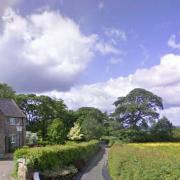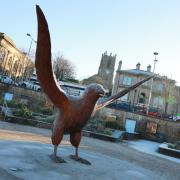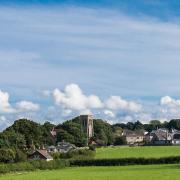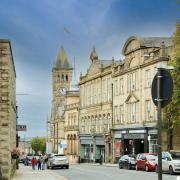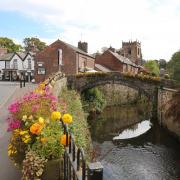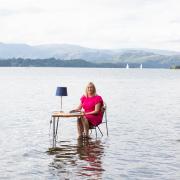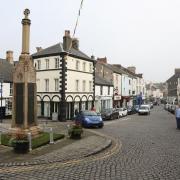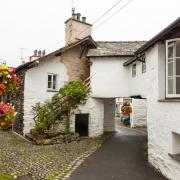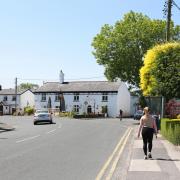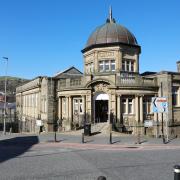Cancer survivors from across Lancashire are finding strength and support in a dragon boat

When Sara Last was diagnosed with breast cancer, aged 44, she was faced with more than a year of clinical procedures. And then, like many women in her predicament, the potter and freelance curator faced the equally daunting aftermath, with flagging confidence, worry about the disease returning and even isolation.
But like an increasing number of cancer survivors, Sara, of Gatebeck, near Kendal, swears by the emotional and physical restorative properties of dragon boat paddling.
It was introduced to this country by Eve Elliot-Pearson, a former nurse in Liverpool and, fittingly for slow boats, is making slow but steady progress across the UK and Ireland. The benefits are so remarkable that the medical profession is coming round to believe it may be used routinely to help women recover from what was once considered a deadly disease.
Sara says: 'After a mastectomy, chemotherapy and radiotherapy I was discharged by the oncologist in November 2018 and left floundering. Having to go to hospital at least once a week for a year becomes the norm, and then nothing. I felt abandoned... and then I met the Paddlers.

'I had picked up a leaflet from the Breast Care Unit at Lancaster Royal Infirmary, so I decided to go see what it was all about.
'Some of the women come every weekend from across Lancashire, so I was lucky it was close to me. What a bunch of women. They are so welcoming and understanding. They don't talk about cancer, they don't need to. They know what you have been through.
'But if you want to talk about it, ask advice regarding future worries, medication, reoccurrence they then will. They are all in the same boat, literally and metaphorically. By joining the Paddlers for Life I have found a group of women who support each other not only on a Sunday when they meet to paddle, but throughout the week.
'Paddling not only provides fantastic exercise and the opportunity to get out into the stunning surrounds of Windermere, but it also reminds us all that we are part of a team and as a team we can fight this, we can get through this, we are survivors and we will make the most of every moment to come.

'I have only been a member for a few months but I know I have found a second family for life. And I thank them for that!'
The idea originated in Canada in 1996, where researcher Don McKenzie formed a breast cancer survivors' dragon boat team to test the effect of strenuous upper body exercise on lymphoedema and general well-being. The positive results of his research sparked the start of the breast cancer survivors paddling movement and today there are over 200 teams paddling worldwide.
Eve, now 62 of Woolton, was already a dragon boat fan, getting her first vessel in 1992. When she was 38 she was diagnosed with breast cancer and like most sufferers then, she was told what she couldn't do
'All we had were coffee mornings and bingo for breast cancer survivors. I decided it was a load of rubbish and carried on dragon boating,' she says. 'When I went to an event in Philadelphia in 2001, I saw Pink Paddles, for breast cancer survivors, and decided we had to have one back in the UK.'
It took a few years for Eve to get it off the ground, but regular sessions have been running at Liverpool Water Sports Centre, near Albert Dock, once a month, under the name Pool of Life.
'It makes you feel like a warrior. When you get cancer you feel as if you have lost control. The cancer gets a grip of you, but when you start paddling, you feel strong and fit, and get back the power that was taken away from you by the disease.'
Lancashire Life caught up with Eve and her friend Karen Evans, when they travelled to join an off-shoot called Paddle for Life, held every Sunday morning at Low Wood Sports Centre on Windermere.
This is the one Sara attends. Two dragon boats full of survivors, and occasionally partners, paddled from Low Wood to Windermere Jetty museum, three miles there and three miles back, after a stop for cake and coffee.
This group was started by Louisa Balderson, another former nurse, from Morecambe, who had breast cancer in 2004, when she was 45, and had 12 months of treatment.
'Once the initial treatment finishes, it is a lonely and isolating being diagnosed with cancer, she says. 'You are told 'aren't you lucky to be alive', but you can feel lost and cast adrift with a lack of confidence and worry the cancer may reoccur.
'A colleague's sister had been dragon boating in Liverpool and so I was persuaded to join in, even though I had lost the fire in my belly. Just being on the boat with women who had gone through something similar, was uplifting.
'They were like a floating support group.'
She started the sessions at Low Wood with the support of the English Lakes Hotel group which runs the sports centre.
The group has two 42-foot long boats, each with 22-crew, including helm, drummer and strokes.
The boats are dressed with dragons' heads, tails and scales, which have different meanings for different paddlers. Some see the dragon as healing, some see it as the cancer, some as the courage to overcome it.
The Windermere sessions are inclusive with survivors of other forms of cancer joining in. One boat is often filled with family and friends who have supported sufferers. Louisa adds: 'There is something about the rhythm of paddling that is therapeutic. When you have cancer you can lose that rhythm of life, but on a boat with the sound of the water lapping, and the reflections in the water and the beat of that drum, and the feeling of the breeze, you can find mindfulness. There is also a lot of laughter and fun. It is not about sickness, it is about well-being. It is a very privileged experience.'




